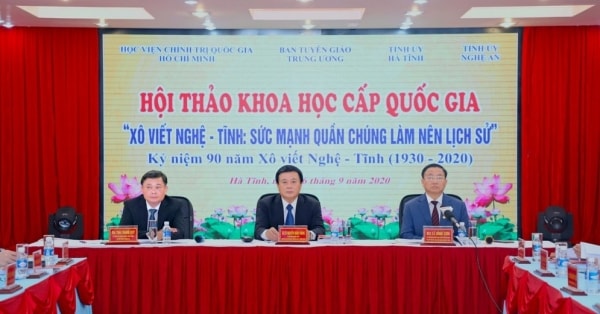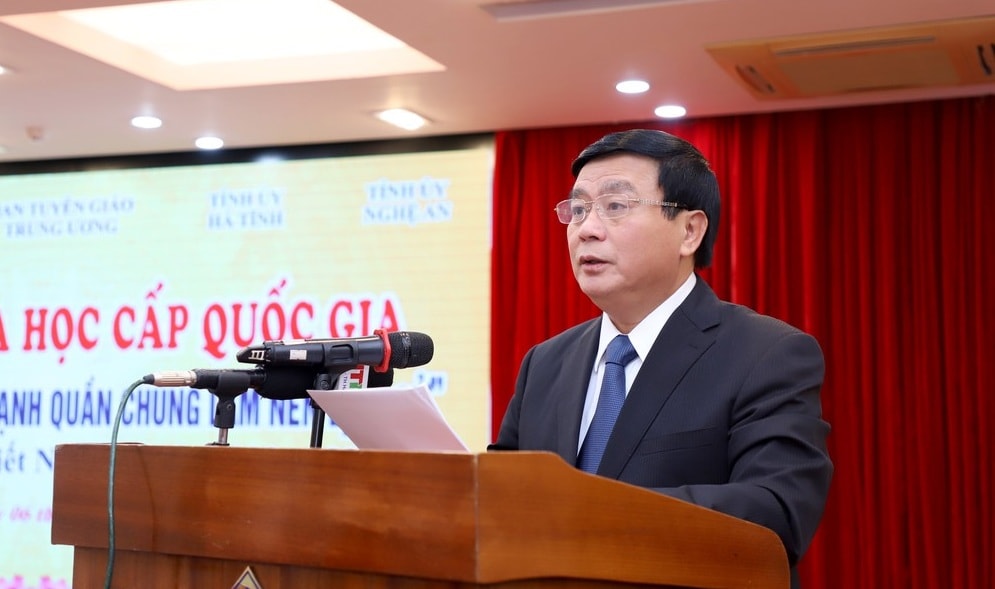(LLCT) - Towards the 90th anniversary of Nghe-Tinh Soviet movement (1930-2020), Ho Chi Minh National Academy of Politics coordinated with the Central Propaganda and Training Commission of the Party, Ha Tinh Provincial Party Committee, and Nghe An Provincial Party Committee to organize the national scientific conference titled “Nghe-Tinh Soviet movement: The power of the masses makes history” on September 6, 2020 in the central city of Ha Tinh.

The chairmen of the national scientific conference titled “Nghe-Tinh Soviet movement: The power of the masses makes history”
The chairmen of the conference were Prof. Dr. Nguyen Xuan Thang, Secretary of the Party Central Committee, Chairman of the Central Theoretical Council, Party Secretary and President of Ho Chi Minh National Academy of Politics; Mr. Le Dinh Son, Member of the Party Central Committee, Secretary of Ha Tinh Provincial Party Committee and Chairman of the Provincial People’s Council; and Mr. Thai Thanh Quy, Alternate Member of the Party Central Committee, Secretary of Nghe An Provincial Party Committee.
Nghe-Tinh Soviet movement is strong evidence of the inevitable victory of the Vietnamese revolution
In his opening and introductory speech, Prof. Dr. Nguyen Xuan Thang, Secretary of the Party Central Committee, Chairman of the Central Theoretical Council, Party Secretary and President of Ho Chi Minh National Academy of Politics, emphasized the conference was an opportunity to affirm great significance of the Nghe-Tinh Soviet movement, clarify, and summarize valuable lessons of the rebellion for the Vietnamese revolution. He said that it was also to honor contributions and sacrifices by generations of cadres, Party members, soldiers, and the people and contribute to educating revolutionary traditions for the young generation. Besides, the conference was aimed to develop trust of cadres, Party members, and the people in the Party’s leadership as well as promote the revolutionary spirit and will of Nghe-Tinh Soviets in the cause of national construction, development, and defense.

Prof. Dr. Nguyen Xuan Thang, Secretary of the Party Central Committee, Chairman of the Central Theoretical Council, Party Secretary and President of Ho Chi Minh National Academy of Politics, makes an opening and introductory speech at the conference
Prof. Dr. Nguyen Xuan Thang affirmed the revolutionary struggles in the 1930-1931 period with the culmination of Nghe-Tinh Soviet movement, triggered 90 years ago, marked the fact that our Party clearly showed its role, bravery, prestige, fighting strength, and great ability in leading, unifying, and mobilizing the people for the first time although the revolutionary Party was very young. This was also persuasive evidence of the inevitable victory of the Vietnamese revolution and the just struggle of our people in the fight for national independence and following the path to socialism. Therefore, the Secretary of the Party Central Committee suggested the participants focus on the discussion to clarify the following basic content: i) affirming and deepening the achievements and great significance of the revolutionary movements in the 1930-1931 period with the culmination of Nghe-Tinh Soviet under the leadership of the Party; ii) clarifying the role of the masses, especially the formation of the coalition of workers and peasants, the core to attract people of different classes in the battle front against imperialism and feudalism; iii) asserting the profound lessons learned from the 1930-1931 revolutionary movements and Nghe-Tinh Soviet for the Vietnamese revolutionary process; iv) promoting the spirit and values of Nghe-Tinh Soviet in the development of their hometowns Nghe An and Ha Tinh as well as the whole country.
Affirming deeply the lesson of taking people as the foundation
The participants of the conference listened to various meaningful presentations on topics such as Nghe Tinh Soviet and some issues on the revolutionary government in Vietnam after the movement, and the leadership of Ha Tinh and Nghe An Provincial Party Committees with the 1930-1931 revolutionary movements and Nghe-Tinh Soviet. The presentations given at the conference included many new documents, which affirmed the revolutionary climax in the 1930-1931 period and the peak of Nghe-Tinh Soviet were a shining milestone, opening the glorious history of the Vietnamese revolution right after the birth of the Communist Party of Vietnam. Each presentation was an independent research discussing particular topics, together displaying a relatively comprehensive, detailed and accurate picture of the 1930-1931 revolutionary climax with the great strength of the masses and its impacts on the national historical process.
Many presentations analyzed and affirmed the leading role of the Party in arousing great power of the masses in the 1930-1931 revolutionary climax and Nghe-Tinh Soviet. Under the leadership of the Party, directly from the provincial Party committees, the people of the whole country and the people of Nghe An and Ha Tinh provinces bravely stood up to fight against the harsh policies of imperialism and feudalism. At that time, being aware of the strength of the masses, the Party committee in the center of Vietnam and the Party committees at all levels in Nghe An and Ha Tinh provinces promptly gave an orientation on objectives and methods of fighting for the working class and the peasants. The leadership of the Party from the central to local levels was a decisive factor leading to the 1930-1931 revolutionary climax, the peak of which was Nghe-Tinh Soviet movement.
The fire of the revolution was lit from the struggle on May 1st, 1930 by the workers from Vinh-Ben Thuy industrial zone, the peasants living near Vinh city, and the people of Nghe An Province’s Thanh Chuong District. From the beginning of September 1930, the revolutionary movement had reached a climax across the country on a large scale and with a drastic nature. The working class clearly showed its leadership and pioneering role in the revolutionary movement. The coordination between the strikes of the workers and the protests of the peasants demonstrated the close attachment of the working class with the peasant class and the people in the fight against imperialism and feudalism. Through the climax of the struggle with unprecedented scale, the coalition between the working class and peasants had become more closely attached. It served as a basis for gathering working classes in the struggle with the desire for independence and freedom.
The meaning of Nghe-Tinh Soviet movement in the cause of national construction, development, and defense today
At the conference, the presentations also affirmed the stature, historical value, and lessons of the 1930-1931 revolutionary climax with the peak of Nghe-Tinh Soviet movement for the Vietnamese revolutionary process. At the same time, they asserted the spirit of proletarian internationalism of the Communist Party of Vietnam and the Vietnamese working class in the worldwide proletarian revolutionary cause, hitting the rule of the old colonialism of the French colonialists. Despite its failure, the movement brought the Party many valuable lessons. They are a lesson on affirming the leadership role of the Party, especially promoting the role of the Party organizations at the grassroot level; a lesson on the methods of fighting to gain and keep the government; a lesson on building a close relationship between the Party and the people, and the alliance relationship between the workers and the peasants; and a lesson on the mobilization, organization, and promotion of great strength of the masses to make history. It also provided a great lesson on the Party’s charisma to gather a large number of people through right guidelines and slogans for fighting that met the burning aspirations of the people. Moreover, the Nghe-Tinh Soviet movement showed the creativity of the masses in flexibly applying forms of organizations and fighting to protect the government in its different phases. The lesson on promoting the strength of the masses is of great importance in building the great unity bloc of the entire nation and creating synergy to successfully implement industrialization, modernization, and international integration as well as to build and firmly protect the Socialist Republic of Vietnam.
In his conclusion and closing remarks, Prof. Dr. Nguyen Xuan Thang emphasized that 90 years passed, the resonance and spirit of Nghe-Tinh Soviet has resonated the epic of the Vietnamese revolution. The spirit of Nghe-Tinh Soviet movement has not only created momentum for the entire Vietnamese people under the leadership of the Party to achieve great victories in the twentieth century, but also brought confidence and motivation for the entire Party and people to continue promoting the will, the aspiration, the strength of national solidarity in combination with the power of the era as well as to boost rapid and sustainable innovation, creativity, and development in the current context. The lessons learned from the process of leading and directing the 1930-1931 revolutionary climax and Nghe-Tinh Soviet movement has had profound theoretical and practical significance. They need to be refined and applied into the leadership of national construction, development, and defense; thereby successfully building Vietnam with rich people, strong country, democracy, justice, and civilization.
With the great significance of the Nghe-Tinh Soviet movement, the Secretary of the Party Central Committee asked the editorial team to have summarization with the topic “The power of the masses makes history: Lessons from Nghe-Tinh Soviet movement”. Then they could propose it to the Politburo and the Secretariat to contribute to completing the draft document, which would be submitted to the 13th National Party Congress. At the same time, it is the basis for proposing solutions to bring the Party’s resolutions into life. Simultaneously, the organization board of the conference also needs to pay attention to the compilation and revision to complete the conference proceedings. The document has a practical value for researching and communicating, educating on the history of the Vietnamese Communist Party, arousing national pride, enhancing the trust of cadres, Party members, and people from all walk of life in the leadership of Party; thereby contribute to protecting the Party’s ideological foundation and unifying the will and ideology to build a stronger, more dignified, and more beautiful country as the wish of Uncle Ho.
LLCT (Source:hcma.vn)